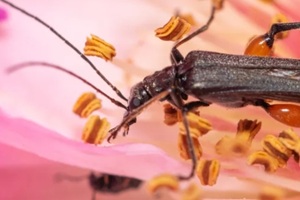 Fall is rife with bright colors, fallen leaves, and the sweet smell of autumnal change. However, it’s not just humans who can spot the difference in seasons! Fall bugs also take note of the falling temperatures and gradual shortening of daylight hours, and their first priority is to find a safe, warm place to stay for the winter. If you were a bug, your first choice would be a human’s home!
Fall is rife with bright colors, fallen leaves, and the sweet smell of autumnal change. However, it’s not just humans who can spot the difference in seasons! Fall bugs also take note of the falling temperatures and gradual shortening of daylight hours, and their first priority is to find a safe, warm place to stay for the winter. If you were a bug, your first choice would be a human’s home!
For the humans who live inside, the sudden influx of bugs in autumn may come as a surprise. But before you break out the pesticide sprays and poison traps, consider the effect these chemical treatments have on the environment.
From sprays that leach their chemicals into the ground (and later, the water that returns to rivers and other locations) to poisoned bugs who escape the home only to be consumed by helpful animals like birds, chemical-based treatments can harm the environment. Instead, consider starting with eco-friendly fall bug deterrents for your Massachusetts home.
Oils
Bugs sense the world around them through antennae and even their feet, which may have special receptors to indicate what they are walking on. If you can get a bug to sense (or walk on) something it dislikes, it will turn right around and leave.
Mosquitoes will turn tail at the first hint of citronella — an oil derived from citronella grass. Spreading some of this oil around the home (or even on your arms and legs) can create an unpleasant cloud of smells mosquitoes strongly dislike.
Oils are great not just for their smells but also because of their texture. Many insects either have difficulty walking in oil or do not want it in their mandibles — which is why it works especially well for biting bugs like fleas and ticks. Brighten up your home with the lovely smell of your favorite essential oils while inhibiting these problematic bugs and keeping your pets safe.
Live Plants
Nature has found its own way to deal with pests, and smart humans can take advantage of these natural adaptations. Cinnamon, basil, and garlic will naturally create a protective barrier around themselves that bugs seek to avoid. Depending on your location, cultivating these plants inside or outside the home can be a major deterrent.
Desiccants and Inhibitors
A desiccant is a material that causes something to dry out, and this type of inhibitor is especially potent against bugs. When bugs dry out, they have difficulty moving, their exoskeleton may become brittle, and they will not be able to molt, leading to death.
Enter diatomaceous earth — a powder made of coarse rock and algae particles. Simply sprinkling diatomaceous earth around any place you have seen bugs can stop them in their tracks, and this material does not harm humans or pets.
Alternatively, draw chalk lines around the home. Ants hate walking through the calcium carbonate that makes up the chalk, and they will find other places to look for food.
Soaps and Liquids
If spiders are a problem, mix some lemon essential oil with soap and water to create an easy DIY repellent spray. For slug problems, crack open a can of beer to share with them; they’ll drown in the aromatic liquid.
Homes facing problems with bugs that leave a scent trail, like ants, can wipe down surfaces with vinegar and water, which destroys these navigational landmarks and disrupts their journeys.
Preventive Measures
 Stopping bugs from getting into the house is more effective than trying to get them to leave. Explore the outside of the home to identify any areas where they may be entering: gaps around pipes and electrical wires, doors with space around them, or windows that do not fully close. Sealing these areas not only keeps the bugs out but can also help to decrease energy bills!
Stopping bugs from getting into the house is more effective than trying to get them to leave. Explore the outside of the home to identify any areas where they may be entering: gaps around pipes and electrical wires, doors with space around them, or windows that do not fully close. Sealing these areas not only keeps the bugs out but can also help to decrease energy bills!
Predatory Bugs
Bugs compete for survival in the wild, so putting your home invaders up against their natural predators can be a powerful deterrent. Planting dill, cilantro, and other herbs encourages visits from ladybugs, dragonflies, beetles, and even some soil mites so they can eat troublesome bugs and their larvae or eggs.
Keep Bugs Away the Nature-Friendly Way
While pesticides can kill a bug on contact, there are plenty of eco-friendly ways to eliminate bugs without the harsh impact on the environment. Start with green pest control options to bring your pest problems under control. If you need tips for how to do this effectively, or if your home is facing an infestation you can’t seem to overcome, trust the professionals to help you reclaim your space.
Contact Spartan Animal & Pest Control for a wide range of bug-inhibiting services, no matter which insects are causing you problems.



